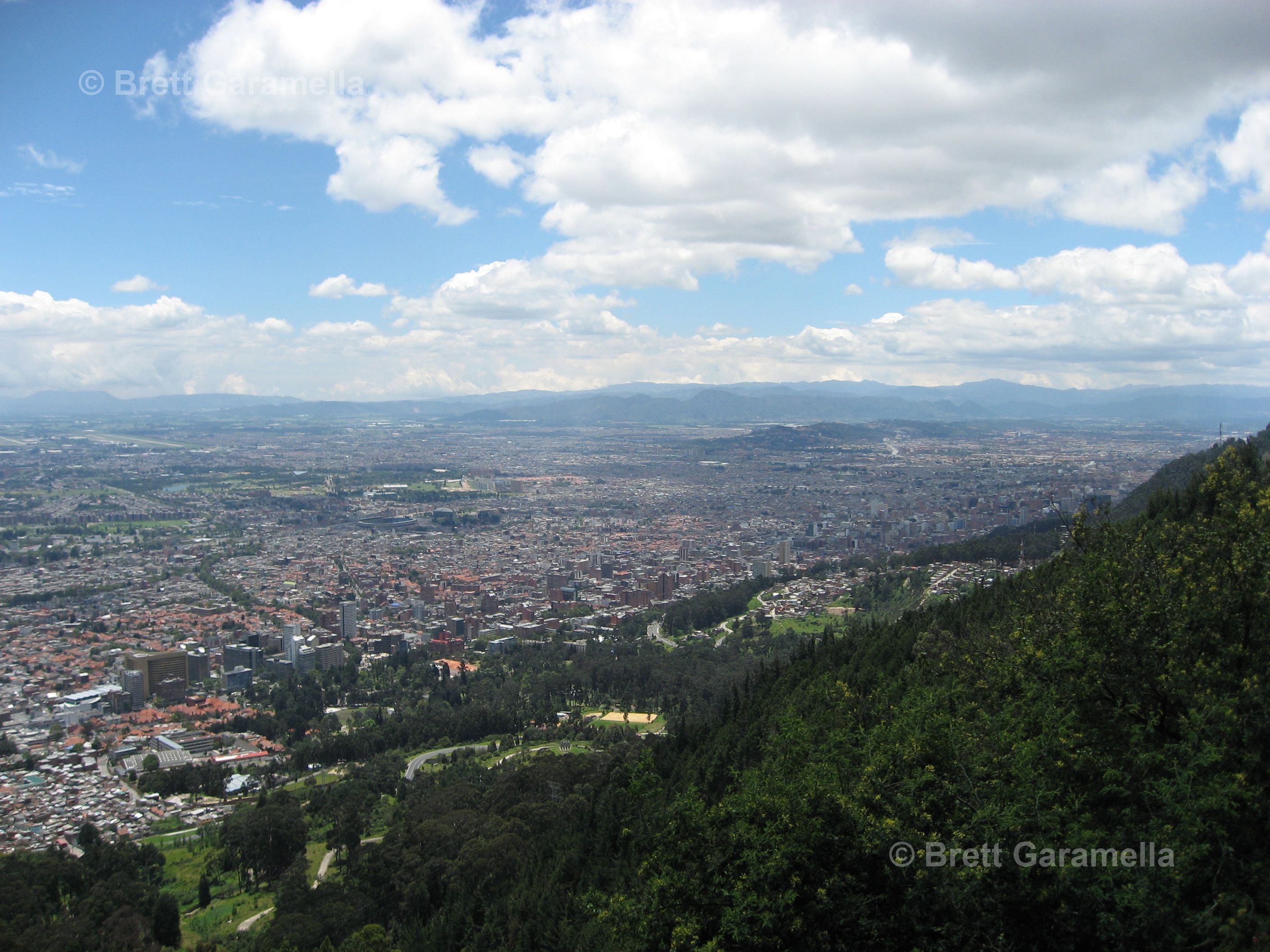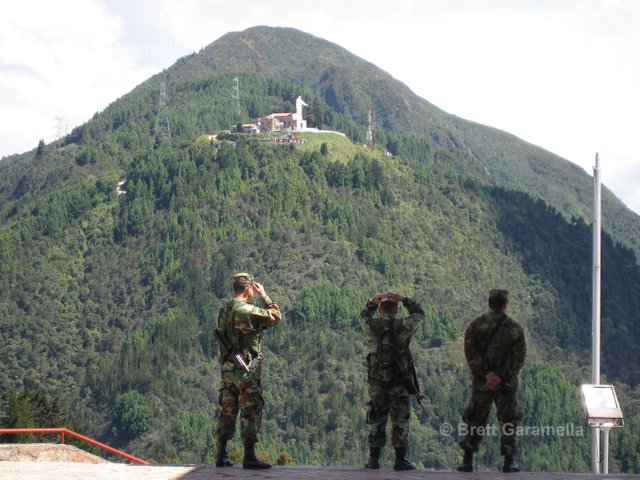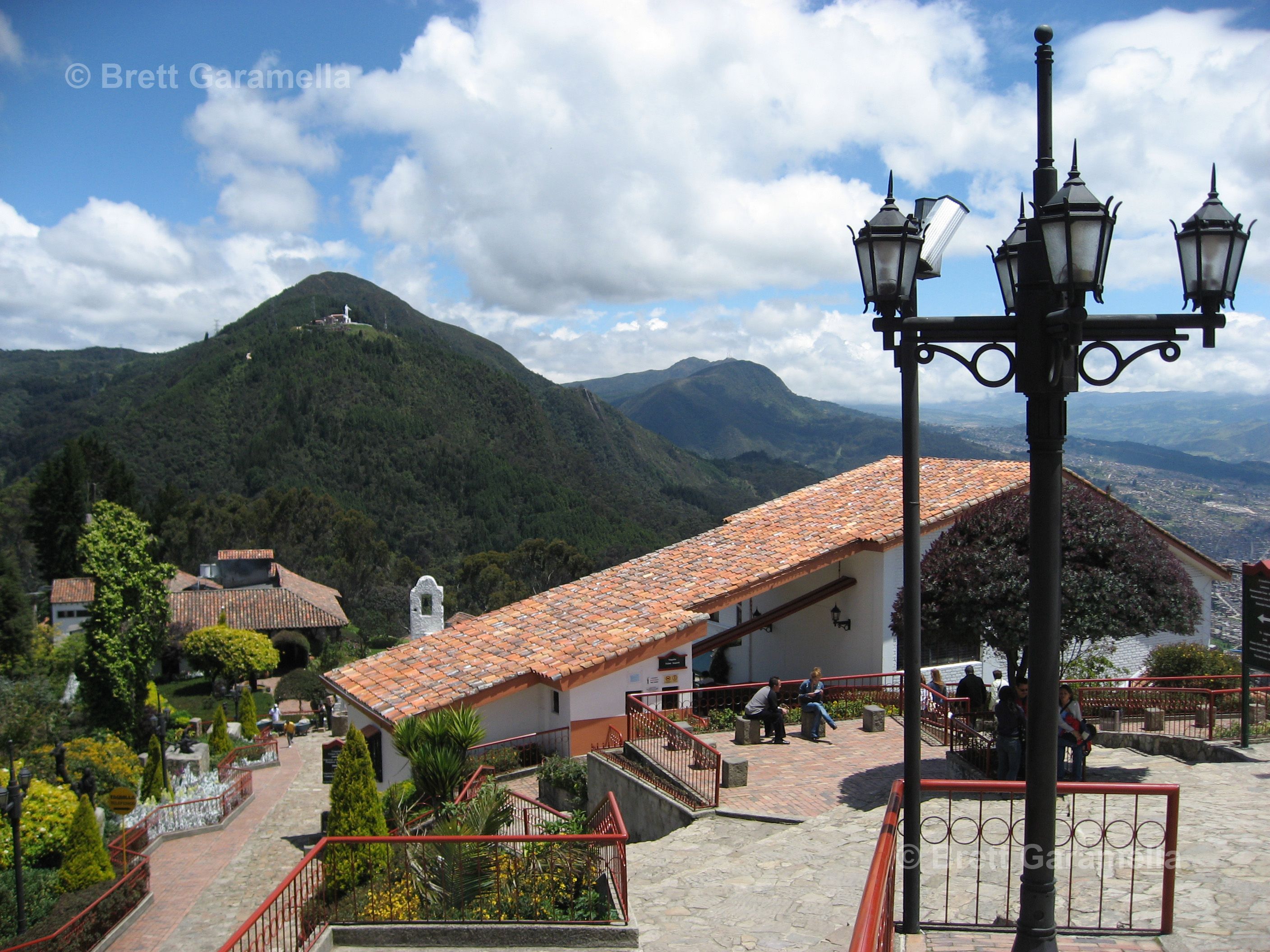Monserrate (Bogota, Colombia)
Getting There
The weather is moderate all year round in Bogota and the sky is often a mixture of gray and white clouds. Sometimes it rains and I’ll look up and see the sun and a blue sky just a few blocks away. September through November is the rainy season. Today was the exception.

So I decided to hike up Monserrate, a mountain peak that provides a bird’s-eye view of the city. When I told the cleaning lady in my building I was going to Monserrate, she insisted I call a taxi to pick me up. (The most safe and reliable taxis have the telephone numbers 311-1111 or 411-1111 or 611-1111, basically any number with six one’s. Also, most of the taxis are yellow). She dialed the number for me and in less than a minute a taxi was in front of my apartment. The ride cost 8,000 pesos. My driver, Rene Moreno Cardenas, looked like a character in Reservoir Dogs with his shades and slicked back hair. This was my first time taking a cab alone, but a Jesus cross hanging from his rearview mirror comforted me. I’ve talked to several locals and foreigners who say they’ve taken taxis at all hours of the day and night, alone, without a problem. Others, like the cleaning lady, insist I call a taxi because it is dangerous. Latin women tend to be overprotective and worry a lot. Swedish women, like my mother, tend to think the opposite, which is probably one reason why I rarely ever worry. Anyhow, Rene Moreno recommended some attractions on the short ride down Carrera 7 or La Septima, the main three-lane road outside my apartment. To my left (the east) I saw hulking dark-green mountains that run the length of the city. Many of them look unclimbable because they are so steep. Monserrate is no exception.
The Hike
A white colonial mansion with a red-tiled roof, the Quinta de Bolivar, sits at the base of Monserrate and was once the home of Simon Bolivar. It’s now a museum. I didn’t go in. It was too nice a day. On the other side of it there were cable wires and train tracks that provided two ways for visitors to get to the top. I preferred the third option, hiking.
The path began on the left side of the mountain and was built for tourists. The entire path was made from stones and flat and was like walking up a sidewalk with many stairs in the steep areas. On the sides stood food and beverage stalls and small shacks, most of them with corrugated tin roofs and vacant and rundown. While the path was uninspiring, the view wasn’t. I’d constantly turn and look at the skyscrapers below and the countless red-tiled roofs around it and the city beyond to tall hills in the west that were covered in patches of shade from the white puffy clouds that seemed to rest on top of them. The sky was blue, but the clouds created its real beauty, hanging low like they always do in Bogota. It’s a great day to be alive, I thought to myself. There were some food stalls open and a few shacks where people lived. However, since it was a Friday, I often passed through stretches where I didn’t see a soul. A few locals, including a woman who was hiking barefooted while carrying her shoes, told me to be careful because it was dangerous hiking alone.
The local hikers were not the only one’s warning me. “It is best not to go alone,” says the Footprint Handbook on hiking Monserrate. “On weekdays, it is not recommended to walk up and especially not down.” When someone says I shouldn’t do it or it can’t be done that is just more incentive for me to do it. That, and I’m stubborn. But even more so, when I decide to do something, I have to do it, sometimes against sound advice. In this case, I think I was right. Most people I passed said hello. The only problem I ran into was a shortness of breath at a couple steep spots. I was nearly two miles above sea level when I reached the top.
From the Top
The view is spectacular from the top, but it doesn’t come as a surprise since I had a good panoramic view at many spots along the way. I was glad I had chosen a weekday to go up as it becomes much more crowded on Saturdays, and especially Sundays, the one day off for most working people. Atop Monserrate is a modern-looking whitechurch with red-roofing and a red steeple. There is a large courtyard next to the church leading to a couple of fine-dining restaurants and a path with many touristy knickknacks and food stalls. The next mountain-peak over, Guadalupe, is higher and is best reached by car. I stopped at one of the food stalls and had rice and chicken with a great view of the mountain opposite the city. In this case, however, my photos do more justice than my words.
Afterward
For me, hiking down is always less fun. Not only am I leaving the top, but it’s harder on my knees. I was ready, however, to go home. I had forgotten to wear suntan lotion and my arms and face were very red. I walked down with a 40-year-old local woman who hikes Monserrate once a week for exercise. I zipped up the light jacket I had brought to cover my arms and as much of my neck as possible. At the bottom I walked on the shaded part of the street as she walked on the opposite side, leading me to the right bus I needed to take home.

Once we arrived in a commercial area, a pretty woman was running toward me telling me to stop. At the top of the mountain I saw two pretty women and one of their mother’s. I offered to take a picture of the three of them since they were taking pictures. The woman stopping me was the older woman. I thought she wanted another picture. She wanted to introduce me to her friend, who liked me. To make a long story short, the four of us had a drink together and walked around La Candelaria, adistrict of downtown with beautiful colonial buildings and narrow cobbled roads, reminding me of Europe. We saw the Presidential Palace and took pictures in Plaza Bolivar, also a sanctuary for pigeons. In the plaza were rows of white crosses with the names of the Colombians who had died when the M-19 guerrilla group attacked the Supreme Court building in 1985. It was the anniversary. One of the woman spoke English and explained the history and significance of the buildings we saw. Both of them were from Cali, the second largest Colombian city and a lot warmer. They were flight attendants for Air Republica. The mother of the woman who spoke English lived in Bogota. Hence they were visiting. We both were. I had a sunburn and they were cold in jackets, jeans, and boots.
